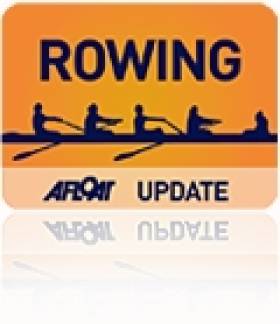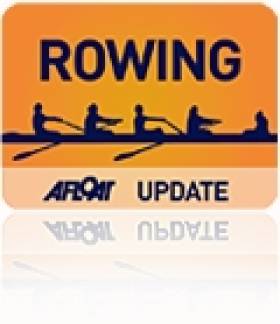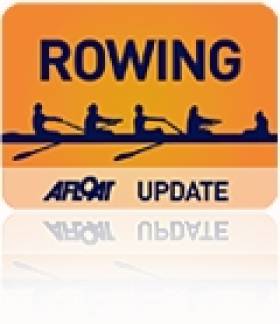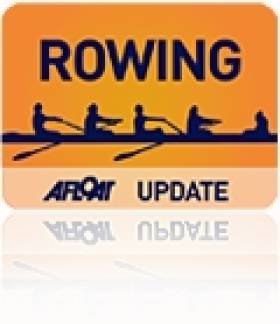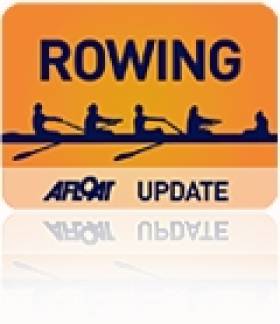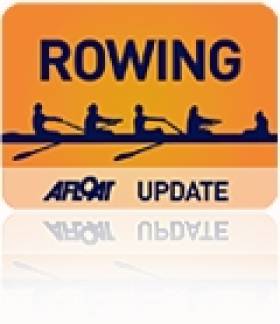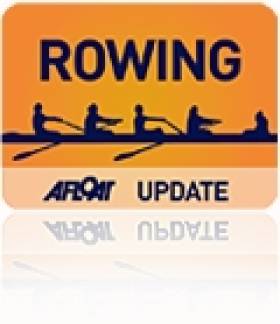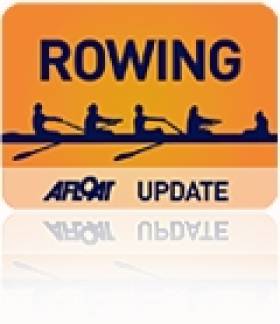Displaying items by tag: Irish Rowing Championships
#ROWING: Defending champions NUIG/Gráinne Mhaol came under severe pressure from Trinity, but held on to win their third successive men’s senior eights title at the Irish Rowing Championships at the National Rowing Centre today.
Trinity eked out a lead of three-quarters of a length by 500 metres and kept the champions at bay until 1800 metres. But the NUIG/Gráinne Mhaol lead was not a comfortable one, as Trinity came back at them. There was just .41 of a second in it at the end.
Cork Boat Club and NUIG teamed up to win the women’s senior eight, while Shane O’Driscoll and Gary O’Donovan teamed up to win the intermediate double sculls. There was an impressive win for Jasmine English in the women’s intermediate single sculls, and Skibbereen won the women’s junior quadruple sculls.
The men’s junior pair saw twins David and Brian Keohane of Presentation hold off a strong challenge from Portora, while NUIG were the fastest crew in the women’s club eight.
Irish Rowing Championships, National Rowing Centre, Cork (Selected Results; Finals)
Men
Eight – Senior: 1 Gráinne Mhaol/NUIG (D Mannion, K Neville, R Bennett, R O’Callaghan, F Tolan, A Martin, C Folan, J Wall; cox: R Cooke) 5:39.51, 2 Trinity 4:39.92, 3 UCD/Old Collegians 5:47.29.
Four – Club: 1 UCD 6:51.22, 2 Cork 6:40.62, 3 Skibbereen A 6:40.91.
Pair – Intermediate: 1 St Michael’s 6:49.21, 2 Carlow B 6:49.99, 3 Commercial 6:55.92. Junior: 1 Presentation (D Keohane, B Keohane) 6:57.14, 2 Portora 7:00.23, 3 Cork BC 7:02.05.
Sculling,
Double – Intermediate: 1 Skibbereen (S O’Driscoll, G O’Donvan) 6:25.84, 2 Shannon 6:39.93, 3 Queen’s 6:44.48. Junior: 1 St Michael’s (P O’Connor, D O’Malley) 6:38.32, 2 Waterford 6:39.34, 3 Shandon A 6:47.81.
Single – Senior: 1 Lee Valley (J Keohane) 6:56.48, 2 UCD (P O’Donovan) 6:58.36, 3 Three Castles (E Grigalius) 6:59.10.
Women
Eight – Senior: 1 NUIG/Cork BC (A Wickham, C Hurst, M O’Neill, L Hamel, E Tormey, F Judge, A Keogh, B O’Brien; cox: S Kelly) 6:29.49, 2 Trinity 6:35.66, 3 UCD 6:36.66. Club: 1 NUIG 6:38.62, 2 Portora6:39.86, 3 Queen’s 6:45.51.
Four, coxed – Intermediate: 1 St Michael’s 7:10.71, 2 Skibbereen 7:16.53, 3 Commercial 7:19.38.
Pair – Junior: 1 Cork Boat Club (D Forde, O Forde) 7:42.57, 2 Muckross 8:02.34, 3 Shandon 8:08.22.
Sculling, Quadruple – Junior: 1 Skibbereen 6:58.74, 2 Commercial 6:59.02, 3 Cork 7:08.09.
Single – Senior: 1 Old Collegians (C Lambe) 7:46.66, 2 Commercial (C Jennings) 8:01.90, 3 Commercial (Sarah Dolan) 8:03.35. Intermediate: 1 Belfast BC (J English) 8:00.93, 2 Cork (Desmond) 8:05.73, 3 Killorglin (Foley) 8:08.78.
#ROWING: It was morning of Limerick wins in Cork at the Irish Rowing Championships at the National Rowing Centre in Farran Wood.
Carlow led well in the men’s intermediate pair, only to be overhauled by a stunning finish by Robert Sheehan and Mark O’Brien – they won by .68 of a second.
In the men’s junior double, Patrick O’Connor and David O’Malley of St Michael’s chased down and passed Andrew Goff and Raymond O’Mahony of Waterford coming up to the line. The Waterford men, to their credit, kept going, but St Michael’s won by just over a second.
The women in the St Michael’s intermediate coxed four had started the good run for the club, with Skibbereen second.
Cork Boat Club had another reason to celebrate thanks to the Forde sisters from Torrevieja in Spain, who were totally dominant in the women’s junior pair.
Claire Lambe of Old Collegians led the women’s senior single sculls from early on, and completely dominated once Siobhán McCrohan dropped out after a quarter of the race.
The men’s single was a much better race. John Keohane completed his three-in-a-row with a come-from-behind win against Paul O’Donovan of UCD. Eimantas Grigalius of Three Castles also finished well to take third.
UCD won the final race of the session, the men’s club coxed four.
Irish Rowing Championships, National Rowing Centre, Cork (Selected Results; Finals)
Men
Four – Club: 1 UCD 6:51.22, 2 Cork 6:40.62, 3 Skibbereen A 6:40.91.
Pair – Intermediate: 1 St Michael’s 6:49.21, 2 Carlow B 6:49.99, 3 Commercial 6:55.92.
Sculling,
Double – Junior: 1 St Michael’s (P O’Connor, D O’Malley) 6:38.32, 2 Waterford 6:39.34, 3 Shandon A 6:47.81.
Single – Senior: 1 Lee Valley (J Keohane) 6:56.48, 2 UCD (P O’Donovan) 6:58.36, 3 Three Castles (E Grigalius) 6:59.10.
Women
Four, coxed – Intermediate: 1 St Michael’s 7:10.71, 2 Skibbereen 7:16.53, 3 Commercial 7:19.38.
Pair – Junior: 1 Cork Boat Club (D Forde, O Forde) 7:42.57, 2 Muckross 8:02.34, 3 Shandon 8:08.22.
Sculling
Single – Senior: 1 Old Collegians (C Lambe) 7:46.66, 2 Commercial (C Jennings) 8:01.90, 3 Commercial (Sarah Dolan) 8:03.35.
#IrishRowingChampionships: NUIG/Gráinne Mhaol produced one of their best ever rows to win the senior eights championship of Ireland at the National Rowing Centre in Cork today. The defending champions had a fine start and upped the tempo down the course to burn off their rivals. They set a time of six minutes 13.38 seconds in headwind conditions. Queen's University were second and UCD third.
The women’s senior eight from St Michael’s created history by becoming the first senior eight solely from the club to win a senior eights championship. Sinéad Jennings, who was not originally entered, but had been part of the crew as it was formed, came in for Emily Tormey.
Skibbereen brought their tally of titles at the Championships to six with wins in the men’s intermediate double sculls and the women’s junior quadruple sculls, while Lee won the men’s junior pairs and Sinéad Dolan of Trinity the intermediate single sculls.
The last race of Championships, which were sponsored by Hanley Calibration, was the women’s novice eight, where Queen’s University took the title.
Irish Rowing Championships, National Rowing Centre, Farran Woods, Cork – Day Three (Selected Results, Finals)
Men
Eight – Senior: 1 Gráinne Mhaol/NUIG (R O’Callaghan, R Bennett, D Mannion, N Kenny, E Donnelly, A Martin, C Folan, J Wall; cox: R Cooke) 6:13.38, 2 Queen’s University, Belfast 6:17.87, 3 UCD 6:17.94.
Four – Novice, coxed: 1 Queen’s 7:49.87, 2 UCD 7:50.79, 3 UCC 7:55.25.
Pair – Intermediate: 1 UCC 8:13.04, 2 Portora 8:36.82, 3 Bann 8:42.84. Junior: 1 Lee 7:45.41, 2 Clonmel 7:49.17, 3 Shandon 7:56.48.
Sculling, Double – Intermediate: 1 Skibbereen B 7:30.60, 2 Skibbereen A 7:36.20, 3 Belfast BC 7:36.79. Junior: 1 Shandon (J Casey, A Harrington) 7:55.13, 2 Skibbereen 8:13.06, 3 Lee 8:19.07.
Single – Senior: 1 Lee Valley (J Keohane) 8:00.96, 2 Three Castles (E Grigalius) 8:03.83, 3 Portadown (S McKeown) 8:21.55.
Women
Eight – Senior: 1 St Michael’s (A Leahy, S Jennings, J O’Keeffe, A O’Sullivan, K O’Brien, A Sheehan, O McEvoy, H O’Sullivan; cox C McGowan) 7:14.80, 2 UCD 7:22.21, 3 Cork/Skibbereen 7:22.95. Four, Intermediate, coxed: 1 St Michael’s 8:10.43, 2 UCD C 8:18.36, 3 UCD A 8:28.10. Novice: 1 Queen’s 7:34.56, 2 Bann 7:36.42, 3 Commercial 7:43.41.
Pair – Junior: 1 Portora (D Maguire, P Mulligan) 9:04.90, 2 Muckross 9:16.42, 3 Shannon 9:19.32.
Sculling, Quadruple – Junior: 1 Skibbereen 7:52.92, 2 Cork BC A 8:03.87, 3 Cork BC B 8:06.00.
Single – Senior: 1 UCD (C Lambe) 9:09.20, 2 St Michael’s (S Jennings) 9:10.31, 3 Three Castles (H Walshe) 9:28.57. Intermediate: 1 Trinity (Sinéad Dolan) 9:22.10, 2 NUIG (C Hurst) 9:30.96, 3 Trinity (S O’Brien) 9:35.91.
Battling Performances Make Keohane and Lambe Champions
#IrishRowingChampionships: Claire Lambe and John Keohane won the men’s and women’s senior single sculls titles at the Irish Rowing Championships at Farran Woods in Cork today. Both had hard battles before crossing the line as winners.
Lambe had a disappointing start and saw Sinéad Jennings take and hold the lead until halfway. Lambe came back and led by 1500 metres, but Jennings mounted challenge after challenge.
Keohane took the lead early on but had to battle to retain it. Eimantas Grigalius, a World Junior Champion in 2003, drove hard a the Corkman through the closing 500 metres, but Keohane, rating below his opponent, retained his lead – and the title he won last year.
There was great excitement in the closing stages of the men’s novice coxed four. UCD’s lead was eaten away and then completely lost to Queen’s University, who won by .92 of a second. UCD also lost out in the women’s intermediate coxed four to a strong St Michael’s crew of Hannah McCarthy, Emily Tormey, Kate O’Brien, Hanah O’Sullivan and cox Conor McGowan.
The men’s intermediate pair and the women’s junior pair and men’s junior double sculls were convincingly won by UCC, Portora and Shandon respectively.
Irish Rowing Championships, National Rowing Centre, Farran Woods, Cork – Day Three (Selected Results, Finals)
Men
Four – Novice, coxed: 1 Queen’s 7:49.87, 2 UCD 7:50.79, 3 UCC 7:55.25.
Pair – Intermediate: 1 UCC 8:13.04, 2 Portora 8:36.82, 3 Bann 8:42.84.
Sculling, Double – Junior: 1 Shandon (J Casey, A Harrington) 7:55.13, 2 Skibbereen 8:13.06, 3 Lee 8:19.07.
Single – Senior: 1 Lee Valley (J Keohane) 8:00.96, 2 Three Castles (E Grigalius) 8:03.83, 3 Portadown (S McKeown) 8:21.55.
Women
Four, Intermediate, coxed: 1 St Michael’s 8:10.43, 2 UCD C 8:18.36, 3 UCD A 8:28.10.
Pair – Junior: 1 Portora (D Maguire, P Mulligan) 9:04.90, 2 Muckross 9:16.42, 3 Shannon 9:19.32.
Sculling, Single – Senior: 1 UCD (C Lambe) 9:09.20, 2 St Michael’s (S Jennings) 9:10.31, 3 Three Castles (H Walshe) 9:28.57.
#IrishRowingChampionships: Experience counts in difficult conditions, and the water became very choppy for the second session of finals at the Irish Rowing Championships. Sinead Jennings described it as “the hardest conditions I have rowed in” but the 36-year-old former world champion stayed out in front of Orla Hayes to win the lightweight single sculls. Catríona Jennings battled hard in the novice single sculls but had to settle for fourth, in a race won by Emily Hegarty of Skibbereen.
The final of the women’s senior pair was also a battle – but one which the NUIG crew of Lisa Dilleen and Aifric Keogh had won with hundreds of metres to go. Their closest rivals were Ailish Sheehan and Emily Tormey of St Michael’s – the two rowers who will join them in the Ireland four at the World Under-23 Championships next week.
The duel between Skibbereen and Shandon in the men’s junior quadruple sculls was also a fascinating one, with Shandon coming out on top by the closing stages. However Aodhán Burns of Skibbereen left the destination of the title in no doubt in the intermediate single - he led all the way down the course.
What Albert Maher called the “mileage” put in by the Commercial senior quadruple stood to them in their contest with a brave UCD crew which continued to fight it out down the course.
The junior women’s eight of Galway Rowing Club brought the club their second title of the day with a good win. Remarkably, the eight rowers – Femhe Caffrey, Claire Caulfield, Cara Cunningham, Ruth Cummins, Megan Donnelly, Kellie Wade, Fiona Murtagh and Clare Elwood – had also won this title last year. Last year they were coxed by Affraic O’Regan, while his year Normagh Heaney coxed the crew.
Irish Rowing Championships, National Rowing Centre, Farran Woods, Cork – Day Two
Men
Eight – Intermediate: 1 NUIG, 2 UCD, 3 UCC.
Pair – Senior: 1 Galway RC A (A Miller, M Ewing) 7:29, 2 NUIG (R Bennett, R O’Callaghan) 7:30, 3 St Michael’s B (D Power, K O’Connor) 7:44.
Sculling, Quadruple – Senior: 1 Commercial 7:17, 2 UCD 7:19, 3 Skibbereen 7:28. Junior: 1 Shandon 7:16, 2 Skibbereen 7:21, 3 Lee 7:31.
Single – Intermediate: 1 Skibbereen (A Burns) 9:04, 2 Shannon (Carmody) 9:12.78, 3 Clonmel (Prendergast) 9:13.29. Novice: 1 Portadown (S McKeown) 8:21, 2 Athlone (Munnelly) 8:24, 3 University of Limerick (Haugh) 8:28.
Women
Eight – Junior: 1 Galway RC 8:11, 2 Portora 8:20, 3 Bann 8:24.
Pair – Senior: 1 NUIG (A Keogh, L Dilleen) 9:11, 2 St Michael’s RC 9:22, 3 Skibbereen 9:45.
Sculling, Quadruple – Senior: 1 Skibbereen/Killorglin, 2 Commercial/ Three Castles.
Double – Intermediate: 1 NUIG (C Hurst, A Keogh), 2 Trinity, 3 St Michael’s.
Single – Lightweight: 1 St Michael’s (S Jennings) 9:51, 2 Skibbereen (O Hayes) 9:56, 3 St Michael’s (S Clavin) 10.29. Novice: 1 Skibbereen (E Hegarty) 10:42, 2 Commercial (Foley) 10:52, 3 Queen’s (Edwards) 11:10. Junior: 1 Fermoy (H Shinnick) 9:20, 2 Belfast (K Turner) 9:44, 3 Carrick-on-Shannon (C Kelly) 9:48.
NUIG Intermediate Rowing Eight Masters UCD
#IrishRowingChampionships: NUIG continued where they left off on the second day of the Irish Rowing Championships at the National Rowing Centre in Cork. Their intermediate eight were full of conviction as they charged through the line to beat UCD, and the NUIG women’s intermediate double scull of Cliona Hurst and Aifric Keogh snapped up their title soon after.
The men’s pair went to Michael Ewing and Alex Miller, who are based in Belfast and England respectively but were representing Galway Rowing Club. St Michael’s won the men’s junior coxed four and Killorglin/Skibbereen the two-boat senior women’s quadruple sculls.
The irrepressible Hilary Shinnick brought her tally of junior single sculls’ titles to three with a pillar-to-post win, while novice single sculler Sam McKeown got off the mark in Irish titles with a good win for his club, Portadown.
Irish Rowing Championships, National Rowing Centre, Farran Woods, Cork – Day Two
Men
Eight – Intermediate: 1 NUIG, 2 UCD, 3 UCC.
Pair – Senior: 1 Galway RC A (A Miller, M Ewing) 7:29, 2 NUIG (R Bennett, R O’Callaghan) 7:30, 3 St Michael’s B (D Power, K O’Connor) 7:44.
Sculling, Single – Novice: 1 Portadown (S McKeown) 8:21, 2 Athlone (Munnelly) 8:24, 3 University of Limerick (Haugh) 8:28.
Women
Sculling, Quadruple – Senior: 1 Skibbereen/Killorglin, 2 Commercial/ Three Castles.
Double – Intermediate: 1 NUIG (C Hurst, A Keogh), 2 Trinity, 3 St Michael’s.
Single – Junior: 1 Fermoy (H Shinnick) 9:20, 2 Belfast (K Turner) 9:44, 3 Carrick-on-Shannon (C Kelly) 9:48
Gráinne Mhaol Win Men's Four at Irish Rowing Championships
#IrishRowingChampionships: Alan Martin won his eighth senior fours title as Gráinne Mhaol laid down a marker for the senior eights on the first day of the the Irish Rowing Championships in Cork today. The experienced crew of Martin, Dave Mannion, Cormac Folan and James Wall were quickly joined by another Gráinne Mhaol winner in Niall Kenny, taking his second successive title in the lightweight single sculls.
Trinity brought their tally of wins up to three when the men’s novice eight and women’s intermediate eight added to the earlier win by the women’s intermediate pair. Three Castles matched their surprise win in the men’s senior double with a more predictable victory in the women’s double by Eimear Moran and Helen Walshe.
Skibbereen’s junior women’s four gave them their only Championship win of the day, while St Joseph’s of Galway took the junior men’s eight – their third in-a-row.
Irish Rowing Championships, National Rowing Centre, Farran Woods, Day One (Selected Results; Finals)
Men
Eight, Junior: 1 St Joseph’s 6:49, 2 Portora 6:54, 3 Neptune 6:58. Novice: 1 Trinity 6:50, 2 UCD 6:56, 3 UCC 7:01.
Four – Senior: 1 Grainne Mhaol (D Mannion, A Martin, C Folan, J Wall) 6:51, 2 St Michael’s 6:59, 3 UCD 7:00.
Intermediate, coxed: 1 UCC 7:14, 2 NUIG A 7:20, 3 Trinity A 7:22.
Sculling, Double – Senior: 1 Three Castles (R Corcoran, E Grigalius) 7:09.86, 3 Commercial 7:17.43, 3 Skibbereen 7:17.51.
Single – Senior Lightweight: 1 Grainne Mhaol (N Kenny) 8:09, 2 Clonmel (A Prendergast) 8:19, 3 Skibbereen (A Burns) 8:30.
Junior 18: 1 Shannon (C Carmody) 8:43, 2 St Michael’s (O’Malley) 8:48, 3 Belfast BC (McKillan) 9:05.
Women
Eight, Intermediate: 1 Trinity 7:47, 2 Galway RC 7:49, 3 UCD A 7:50.
Four – Senior: 1 Cork/NUIG (F Judge, M O’Neill, A Wickham, L Dilleen) 7:33.22, 2 Skibbereen/Killorglin 7:33.52, 3 St Michael’s 7:25.21. Novice, coxed: 1 Commercial 8:11, 2 NUIG 8:14, 3 Queen’s 8:24. Junior: 1 Skibbereen 8:18, 2 Cork BC 8:29, 3 St Michael’s 8:40.
Pair – Intermediate: 1 Trinity (G Crowe, S O’Brien) 9:22, 2 St Michael’s 9:42, 3 Commercial 9:47.
Sculling, Double – Senior: 1 Three Castles (H Walshe, E Moran) 8:13, 2 St Michael’s 8:25.
Junior: 1 Belfast BC (J English, B Jacques) 8:21, 2 Cork BC 8:32, 3 Castleconnell 8:41.
#IrishRowingChampionships: The first session of senior finals at the Irish Rowing Championships started with a tremendous win for the women’s four of Frances Judge, Marie O’Neill, Anna Wickham and Lisa Dilleen from NUIG/Cork Boat Club. The Skibbereen/Killorglin four headed them in the middle stages of the race but Cork/NUIG fought back into the headwind and pipped their rivals by .3 of a second.
In very warm and clear conditions at the National Rowing Centre in Cork, the titles were spread widely. Shannon’s Conor Carmody won the men’s junior single sculls, seeing off a good fight by David O’Malley of St Michael’s; Bridget Jacques and Jasmine English of Belfast Boat Club were clear winners of the junior double sculls; Gill Crowe and Sally O’Brien, who are lightweights, brought the women’s intermediate pair to Trinity with plenty to spare; UCC and Commercial had good wins in the men’s intermediate coxed four and the women’s novice coxed four respectively.
Amongst the most impressive winners were Eimantas Grigalius (27) and Ryan Corcoran (35) of Three Castles. They powered well clear of Commercial and Skibbereen by the finis to win the first Irish Championship for both of them.
Irish Rowing Championships, National Rowing Centre, Farran Woods, Day One (Selected Results; Finals)
Men
Four – Intermediate, coxed: 1 UCC 7:14, 2 NUIG A 7:20, 3 Trinity A 7:22.
Sculling, Double – Senior: 1 Three Castles (R Corcoran, E Grigalius) 7:09.86, 2 Commercial 7:17.43, 3 Skibbereen 7:17.51.
Single – Junior 18: 1 Shannon (C Carmody) 8:43, 2 St Michael’s (D O’Malley) 8:48, 3 Belfast BC (G McKillan) 9:05.
Women
Four – Senior: 1 Cork/NUIG (F Judge, M O’Neill, A Wickham, L Dilleen) 7:33.22, 2 Skibbereen/Killorglin 7:33.52, 3 St Michael’s 7:25.21. Novice, coxed: 1 Commercial 8:11, 2 NUIG 8:14, 3 Queen’s 8:24.
Pair – Intermediate: 1 Trinity (G Crowe, S O’Brien) 9:22, 2 St Michael’s 9:42, 3 Commercial 9:47.
Sculling, Double – Junior: 1 Belfast BC (J English, B Jacques) 8:21, 2 Cork BC 8:32, 3 Castleconnell 8:41.


























